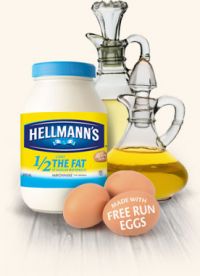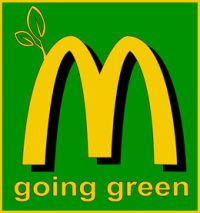 Advertising and marketing play major roles in our daily decision-making. We can easily be influenced by something as simple as a few words in a commercial, or even the colour of a label. Today on Food Matters, I discussed how much ‘greenwashing’ has become part of the sustainable language landscape. The term greenwashing basically means when a company spends more time or money telling you its products or services are ‘green’ or sustainable than they actually spend on making those products or services green. They’re not quite putting their money where their mouths are. I didn’t realize that this term has been around since 1986, when a New York environmentalist called out hotel chains for all those cards they use to tell you to re-use your towels to save the environment really just resulted in more profit for the hotels.
Advertising and marketing play major roles in our daily decision-making. We can easily be influenced by something as simple as a few words in a commercial, or even the colour of a label. Today on Food Matters, I discussed how much ‘greenwashing’ has become part of the sustainable language landscape. The term greenwashing basically means when a company spends more time or money telling you its products or services are ‘green’ or sustainable than they actually spend on making those products or services green. They’re not quite putting their money where their mouths are. I didn’t realize that this term has been around since 1986, when a New York environmentalist called out hotel chains for all those cards they use to tell you to re-use your towels to save the environment really just resulted in more profit for the hotels.
Nowadays, food companies routinely use labeling to convince us their products are greener. Anytime you see a yogurt container from a large manufacturer with a picture of a cow grazing in a field on the label you’re being greenwashed. Large companies need copious amounts of milk to make their products, which means the diet and movement of the cows are strictly controlled…they live in barns and eat a mix of feed designed to make them produce more milk…they don’t graze on grass.
 McDonald’s Green
McDonald’s Green
In 2009, McDonald’s outlets in Europe started changing their colour scheme from red and yellow to green and yellow. The company said the colour change was to reflect its heightened sensitivity to environmental concerns. Recently more supermarket chains here in BC all started to make claims they were now selling sustainable seafood products, products certified sustainable by 3 or 4 different agencies that are out there. But if you go into any of those supermarkets you will find the number of sustainable seafood products available is still far fewer than the number of products that wouldn’t be certified sustainable. One supermarket chain made a big fuss about two summers ago that they carried so many local products, but then rejected a pumpkin shipment from a local farmer because the pumpkins weren’t all the same size and some of them had mud on them.
This really extends into labeling food products when it comes to health benefits. We’ve talked before about the overuse of labels that purport the products inside to be natural or pure, or artisan. Ask yourself when you read those labels, what do those words really mean in conjunction with the food itself or the way it is produced.
Apparently Canada’s Competition Bureau and the Canadian Standards Association are discouraging companies from making “vague claims” about environmental impact. Any claims must be backed up and when I looked at the CSA website they do have measurable standards companies can meet when it comes to categories such as Green Procurement and Environmental Claims and Labeling. But when it comes to food products I’m not sure how many of them actually require CSA approval to be sold, and since we don’t even require labeling of genetically modified products I don’t see that there is a lot of government oversight of environmental claims.
So how do we tell the difference between a real effort to be sustainable and an empty promise? Sometimes it’s obvious, as in the case of the words on labels like ‘all natural’. Other times it’s a lot harder. Hellmann’s Mayonnaise, a brand of Unilever Canada, has been promoting a Real Food movement – and two years ago Hellmann’s public relations company offered me and other bloggers an all-expenses paid trip to Toronto to explain their support of eating local and healthy. I didn’t go on that trip, but on another trip to Toronto on business I put on my skeptical journalist hat and they did a mini-version of their presentation for me. I couldn’t actually see the downside. They wanted to promote local food, help people to demand that from their local grocery stores, and were giving grants to people to help them start community gardens and other sustainable food projects. A couple of weeks ago, I watched a very well done Eat Local Hellman’s YouTube video from 2009 that put forward some amazing stats about how we are NOT eating local, and it encouraged us to eat local, with the Hellmann’s logo only coming up at the very end of the video. I posted it to my Facebook and asked my foodie friends to comment.
 Michael Pollan
Michael Pollan
When this first came up I happened to have a chance to discuss it with journalist and Omnivore’s Dilemma author Michael Pollan. He wasn’t buying it for a minute. Definitely thought it was greenwashing, despite the benefits I described to him. With this latest video I posted to my Facebook page, the comments were more mixed.
I even traced this back to the parent company of Hellman’s, Unilever, and that multinational company has launched what sounds like a fairly major initiative, called the Unilever Sustainable Living Plan, which says it includes: over 50 concrete targets that will:
• Help more than one billion people improve their health and well-being
• Halve the environmental impact of our products
• Source 100% of our agricultural raw materials sustainably
Quite bold. But is it real, how do you measure it? I found something called the Greenwashing Index website, run by the University of Oregon and EnviroMedia Social Marketing. All kinds of info there designed to help you figure out when you’re being greenwashed, and how you can participate by rating ads you see on tv.


Interesting!–especially the mini-history of “greenwashing.” I had no idea the term’s been in use that long. I’ve sometimes used example of greenwashing in my writing classes to raise students’ awareness about less than ethical examples of persuasion (like the classic Kermit the Frog performing “It’s
NotEasy Being Green” in a 2006 Ford Hybrid commercial). It’s so easy for food corps to toss off terms like “pure, organic, healthy” and the greatest offender of all: “natural.” It would be nice if some of the big food corporations were actually being honest about their green efforts.Cheers! ~Amanda
It is difficult to take a big food corporation like Unilever seriously, is there really that much concern in the boardroom, for the living conditions of small farmers around the world? Unilever controls most of the shelf space in certain product ranges throughout the Canadian grocery store. They are into ice cream, dairy creamers and any other edible oil products. They are the largest edible oil company in the world and a big influence in the edible oil industry.
In this new world of sustainable agriculture how is using prime land to grow edible oil and fuel beneficial to local agriculture and small scale and low intense farming? It is such a contradiction to the base philosophy and science based research of low intense farming and sustainable agriculture.
This week we are seeing a long time food player Hostess Brands Inc in Chapter 11, their product line was of a different generation-the space age, Jetsons generation in the mid-sixties- everything in plastic and bleached white. Their products have nothing to do with health and are a huge edible oil player in industry that is uncertain about its future in the food business. The public vision of Wonder bread has lost its cache and is now a symbol of everything that is bad about processed food.
All the benefits of edible oil products are good for the bottom line but are not healthy and now we linking so many of our health problems to the mass increase of consumption of these foods. We in North America are overweight and moving into huge health care problems if we do not control the ever increasing costs because of what we eat.
The big five Corporations that control most of what we eat are looking long and hard into this modern new vision of what and how we eat. They will set themselves up for success and maintain growth in the food sector. They are doing this by buying up most of the big players in the Natural and Alternative food industries. This can be a good thing because they are changing to this new Theo’s but you can bet they will be looking after its bottom line and will do this by any means. Do you really think that its main purpose is to look after nature? The Corporation only interest is profit and when we except that and take everything they say with a grain of salt and question what they say then we the consumer will be better off.
We are hopefully entering into a different food era; Unilever wants to lead us into the pen. Their marketing will be slick and make us think how great they are. They will buy out any big players in the Natural food business and put forth those companies to show us how green they are. The shiny surface will look great but dig below the surface and you will see anomalies bursting at the surface waiting to be found out. They will make huge money playing on peoples fears and desires and we might be pulled into their Public Relation dogma and buy into the program.
Shopping for food is not so simple anymore and maybe if we get back to what was lost-when Food Corporations started the modern food trends- TV dinners- Easy breezy. The trend of today’s modern food craze is looking for the nostalgia. We are spending more time than ever before learning about traditional foods and what our parents ate. There is a human innate need for this comfort and judging by how many cook books and political food novels out there society is hungry for this knowledge.
Eat our words
Pingback: Organic Foods – The Sustainable Diet | African Mango Diets